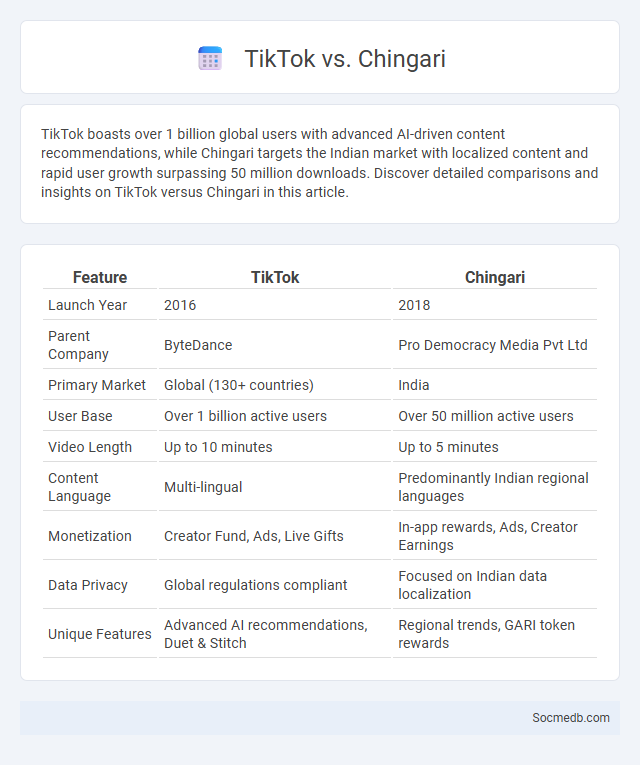
Photo illustration: TikTok vs Chingari
TikTok boasts over 1 billion global users with advanced AI-driven content recommendations, while Chingari targets the Indian market with localized content and rapid user growth surpassing 50 million downloads. Discover detailed comparisons and insights on TikTok versus Chingari in this article.
Table of Comparison
| Feature | TikTok | Chingari |
|---|---|---|
| Launch Year | 2016 | 2018 |
| Parent Company | ByteDance | Pro Democracy Media Pvt Ltd |
| Primary Market | Global (130+ countries) | India |
| User Base | Over 1 billion active users | Over 50 million active users |
| Video Length | Up to 10 minutes | Up to 5 minutes |
| Content Language | Multi-lingual | Predominantly Indian regional languages |
| Monetization | Creator Fund, Ads, Live Gifts | In-app rewards, Ads, Creator Earnings |
| Data Privacy | Global regulations compliant | Focused on Indian data localization |
| Unique Features | Advanced AI recommendations, Duet & Stitch | Regional trends, GARI token rewards |
Introduction: The Rise of Short-Video Platforms
Short-video platforms have transformed social media by delivering engaging content in under a minute, attracting billions of users worldwide. Algorithms on platforms like TikTok and Instagram Reels prioritize personalized feeds that enhance user interaction and content discovery. Your social media strategy must leverage these trends to maximize reach and engagement efficiently.
TikTok Overview: Global Dominance and Features
TikTok stands as a leading social media platform with over 1 billion active users worldwide, dominating markets in Asia, Europe, and North America. Its algorithm-driven content feed prioritizes short-form videos, enhancing user engagement through personalized recommendations and creative editing tools. Key features include viral challenges, audio collaboration, and live streaming, making TikTok a powerful driver of digital trends and influencer marketing.
Chingari Overview: India's Homegrown Alternative
Chingari is India's homegrown social media platform designed to compete with global giants by offering short-form video content tailored to Indian audiences. The app supports multiple Indian languages, enhancing user engagement and promoting local culture. You can create, share, and discover diverse content while benefiting from monetization features unique to Chingari.
User Demographics and Regional Influence
Social media platforms exhibit distinct user demographics, with age groups 18-34 comprising the largest active audience, often influencing content trends and advertising strategies significantly. Regional differences shape platform popularity, as TikTok dominates in North America and Southeast Asia, while WhatsApp and Facebook maintain strongholds in Latin America and Europe. Language preferences and regional internet accessibility directly impact user engagement levels and content localization efforts, driving platform-specific marketing approaches worldwide.
Content Creation Tools and Features Comparison
Content creation tools across social media platforms vary significantly, with Instagram offering intuitive photo and video editing features like filters, stickers, and Reels, while TikTok excels in short-form video creation with advanced effects, sound integration, and duet functionalities. Facebook provides robust Live streaming options and post scheduling through Creator Studio, whereas Twitter emphasizes concise text-based posts supplemented by media attachments and polls for engagement. Comparing these tools highlights how each platform caters to different content strategies, from visual storytelling to interactive conversations, optimizing user reach and engagement.
Monetization and Creator Support
Social media platforms offer robust monetization tools like ad revenue sharing, sponsored content, and subscription models designed to maximize Your earning potential. Creator support programs provide analytics, audience insights, and personalized resources that help content creators grow their brand and increase engagement. Leveraging these features boosts visibility and financial returns by connecting creators with targeted opportunities and communities.
Data Privacy and Security Concerns
Social media platforms collect vast amounts of personal data, raising significant privacy and security concerns for users worldwide. Data breaches and unauthorized access to sensitive information have become increasingly common, exposing users to identity theft and fraud. Implementing robust encryption, multi-factor authentication, and transparent privacy policies are critical measures to protect user data on social media networks.
Community Engagement and Trends
Community engagement on social media drives authentic interactions, fostering loyalty and trust among your audience. Leveraging current trends, including viral challenges and hashtag movements, amplifies content visibility and relevance. Understanding platform-specific behaviors enhances your ability to create impactful, trend-aligned posts that resonate with users.
Algorithmic Content Discovery: Relevancy Explained
Social media platforms utilize algorithmic content discovery to enhance user engagement by analyzing interests, behaviors, and interactions to deliver highly relevant posts. These algorithms prioritize content based on factors such as user preferences, trending topics, and past activity patterns, ensuring personalized and timely content feeds. Continuous machine learning enables these systems to refine relevancy models, increasing content visibility that aligns closely with individual user profiles and maximizing overall user satisfaction.
Future Outlook: The Battle for Short-Video Supremacy
The future of social media is poised to be dominated by the battle for short-video supremacy, with platforms like TikTok, Instagram Reels, and YouTube Shorts aggressively expanding their user bases and content creators. Innovations in AI-driven content personalization and interactive features are driving higher engagement rates and reshaping advertising strategies for brands worldwide. Market analysts predict that short-video formats will capture over 80% of mobile user time spent on social apps by 2026, signaling a major shift in digital consumption habits.
 socmedb.com
socmedb.com